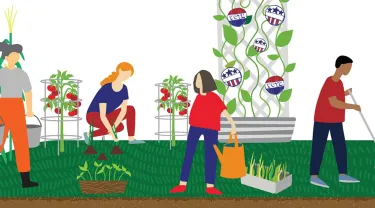People under the age of 30 remain underrepresented in the electorate, with huge disparities in their voting rates depending on race, ethnicity, socioeconomic and education levels, disabilities, and where they live and go to school. That’s according to CIRCLE Growing Voters, a report from the Center for Information & Research on Civic Learning and Engagement (CIRCLE) at Tufts’ Tisch College of Civic Life.
The report recommends a new approach to engaging youth in democracy, outlining steps that schools, policymakers, community groups, and others can take to expand the number of young voters, eliminate inequities in turnout, and create a more representative electorate. It draws on data from CIRCLE’s 2023 survey of teens ages 14 to 17, as well as CIRCLE’s past and ongoing analyses of national elections, voter files, and research on youth civic education and engagement.
Based on rigorous, comprehensive research, the report serves as a guide for every institution and community seeking to play a role in this work. It includes actionable recommendations for educators, organizers, policymakers, journalists, funders, families, young leaders, and more.
“We’ve been studying and supporting youth participation in elections for two decades,” said CIRCLE Deputy Director Abigail Kiesa, one of the report’s five authors. “Cycle after cycle, we’ve seen young people being left out of the process and the resulting political inequality.”
Key recommendations for reversing that trend include “starting early and starting young.” According to the report, that starts with building voter engagement into other processes, such as when young people are getting a library card or driver’s license or going to a health center. Increasing voter preregistration at ages 16 and 17—available in some states but not all—and upping the number of states that allow 16- and 17-year-olds to be poll workers also would help, Kiesa said.
In addition, the report endorses building youth power by encouraging young people to run for office and building systems that help amplify young voices in institutional planning and decision-making. It also points out that securing funding to pay young people for their time on civic engagement efforts—rather than asking them to volunteer—would enable youth who don’t otherwise have the means to participate in electoral work to do so.
Structural changes such as these will encourage more young people to vote, the report concludes, while reducing inequities in turnout and creating an electorate that more accurately reflects the population.
